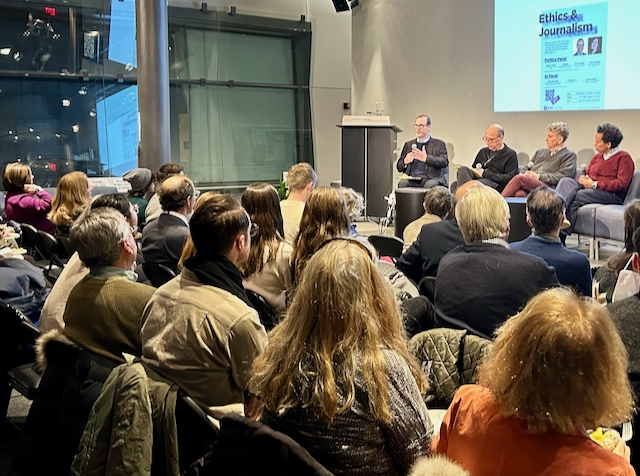Event Date: Nov. 29, 2023
Panelists: Wesley Lowery, a Pulitzer Prize-winning journalist, author and podcast host formerly at CBS News and The Washington Post; Jay Rosen, a leading press critic and reviewer; Lydia Polgreen, a New York Times opinion columnist and podcast host; and Nancy Solomon, a New Jersey Public Radio senior reporter and founding managing editor. Moderator: Stephen J. Adler, director of the Ethics & Journalism Initiative.
View the complete event on YouTube.
The EJI Takeaway
“Not the odds but the stakes”

Horse-race coverage, or stories about voter polling and the odds that one candidate will win over another, dominates political coverage. NYU professor and press critic Jay Rosen has a mantra—”not the odds but the stakes”—that calls on journalists to cover what is likely to happen if a candidate is elected rather than the question of whether a candidate is going to be elected.
As Rosen explained, though we know our audiences are interested in horse-race coverage, the problem is that such coverage “is used as a central organizing principle for campaign coverage.” It outnumbers all other types of campaign coverage—stories about the issues at stake in a given election, voter turnout, voter suppression, etc. But it persists, in part, because it’s adaptable to every single election and it allows journalists to maintain “objectivity” and avoid taking ideological stances in the ways in which they cover elections.
Instead of covering the horse race, journalists need to report their observations
Lydia Polgreen, a New York Times opinion columnist and podcast host, said that rather than report on the odds of elections, journalists should report on what they see—for example, that a candidate struggles to connect with voters, or low turnouts at campaign rallies—rather than the poll numbers.
“[Journalists are] so devoted to this idea that you’re just observing, and the voters are going to decide,” Polgreen said.
But that’s not what’s going to be most helpful to voters; they need to hear journalists’ observations of the election as well. She recommends reporting in a plain-spoken way, using common sense, and sharing with audiences what is being seen in the field.
When reporting on politics, the story you get is not always the story you were looking for
Nancy Solomon, a New Jersey Public Radio senior reporter and founding managing editor, says that even though candidates can stonewall reporters, there are successes to be had with political reporting—sometimes they’re just unexpected.
When reporting on Voting Block, a project where Solomon and other New Jersey Public Radio journalists met with a group of neighbors in New Jersey neighborhoods monthly for a year to talk about the political issues that mattered to them, Solomon stumbled upon a political scandal. When talking with a group of New Jersey neighbors, she learned that one woman who had protested outside of former Congressman Rodney Frelinghuysen’s (R-NJ) office, had lost her job after Frelinghuysen wrote to her employer’s board of directors about her actions. Solomon broke the story, which received national attention and earned the representative an ethics complaint in the U.S. House of Representatives.
“He did not survive that,” Solomon said. Frelinghuysen retired the year after.
Don’t let politicians decide what issues are most important to voters: Ask voters
Polgreen explained that issues-based polling, as opposed to horse-race surveys, can help reporters determine the salience of issues. For instance, neither book bans nor gender-affirming care are incredibly important issues for voters, these polls reveal; the issues are only important to a small group of very vocal voters and to politicians signaling to those voters. Polgreen says media outlets need to be careful to not over-cover issues that aren’t important to the voting public and make them seem more vital to voters than they are.
“You create this kind of self-fulfilling prophecy,” Polgreen said. “And that’s how you end up with an increasing number of people being like, ‘Well, I’m not so sure about that trans stuff’” when just “five minutes ago, [they] didn’t care” or think about the issue.

